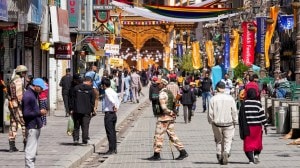States of confusion
It is a truly befuddling situation for the voters in the four states going to Assembly polls in November. Not because they do not have a ...

It is a truly befuddling situation for the voters in the four states going to Assembly polls in November. Not because they do not have a clear choice. In Delhi, Rajasthan and Madhya Pradesh, the choice is clearly between the Bharatiya Janata Party and the Congress. But, the choice ends there. The people are being denied more specific options on two counts in particular. They are not being asked, in the first place, to choose between alternative leaderships. Nor is the electorate being told whether its verdict is being sought on the state issues alone or the Centre’s performance as well. Neither of the contenders has tried unduly hard to conceal its confusion on the questions involved. Like the BJP’s on the leadership issue, conspicuous by contrast with its line in the Lok Sabha polls. The party then went to the people with the slogan of "stable government and able leadership". It also taunted the other parties and their fronts as leaderless. Officially, of course, it has announced the names of its chiefministerial candidates in two states. In neither case, however, does the nomination carry the ring of an inner-party consensus.
If the tantrums of Sahib Singh Verma and his faction, when he was replaced by Sushma Swaraj as Chief Minister, made a public spectacle, Madan Lal Khurana is not exactly being muted in his opposition to her projection as the post-poll leader of the state. Swaraj herself, meanwhile, is sounding far less enthusiastic about the future envisaged for her than about her nightly rounds of the Capital’s thanas. Veteran Bhairon Singh Shekhawat may display no such hesitancy, but the delay in his naming did not help the objective. It did not do so any more than hints that a triumph for the party will only spell his last term in office. The BJP drew a blank in this respect in Madhya Pradesh, and there will be few takers for the theory that this was because of the state’s proposed bifurcation and not any factionalism. The Congress can hardly claim a better show. Least of all in MP, where ChiefMinister Digvijay Singh has had to contend as much with inner-party challengers, including heavyweights like Arjun Singh and Madhavrao Scindia, as with the BJP.
The BJP has spoken in two different voices about what the states should vote upon. Prime Minister Atal Behari Vajpayee has asked the party to advertise the BJP-headed Central government’s "achievements" as part of the poll campaign. Home Minister L.K. Advani agrees. A contradiction cannot but be seen between this stand and BJP president Kushabhau Thakre’s rejection of the idea of the Assembly elections amounting to anything like a "referendum" on the coalition government’s performance. Nor has the Congress made up its mind, to judge by its campaign thus far, to try and make a national verdict of the state polls’ outcome. The uncertainty of the prospects prompts it to keep its options open on this score. Whether either of the camps wants it or not, the results of the first set of Assembly polls to follow the ascent of a BJP-led alliance to power atthe Centre cannot but constitute a pronouncement of national significance.



- 01
- 02
- 03
- 04
- 05



























